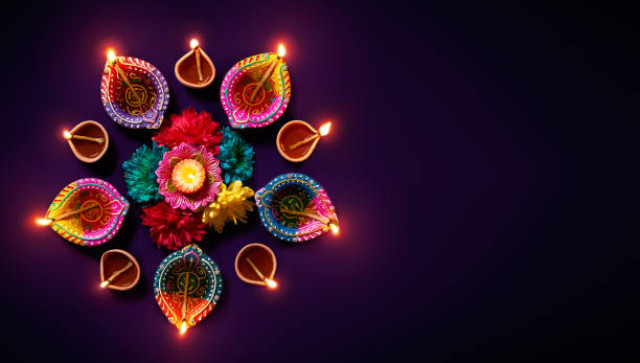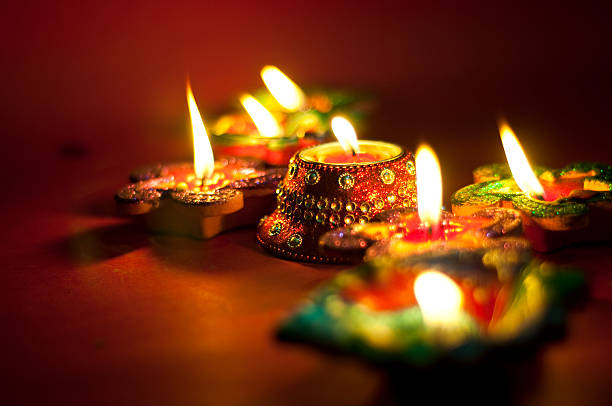Why Do We Celebrate Diwali In India
- Posted on 23-10-2024
- News
- By Saumy Verma
- 414 Views
Diwali, also known as the "Festival of Lights," is one of the most important and widely celebrated festivals in India and across the world by Hindus, Jains, Sikhs, and some Buddhists. The reasons for celebrating Diwali vary based on cultural and religious beliefs, but the overarching theme is the victory of light over darkness and good over evil.

1. Hindu Reasons for Celebrating Diwali
a. Return of Lord Rama (North India):
- Story: In many parts of India, particularly in the northern regions, Diwali commemorates the return of Lord Rama to his kingdom, Ayodhya, after 14 years of exile. According to the epic Ramayana, Rama was exiled due to a family feud and had to face numerous challenges during his exile, including defeating the demon king Ravana, who had kidnapped his wife, Sita. Diwali marks the day when Rama, along with Sita and his brother Lakshmana, returned to Ayodhya. The citizens of Ayodhya illuminated the entire city with rows of oil lamps (diyas) to welcome their beloved king.
- Symbolism: Diwali, in this context, symbolizes the return of light (goodness) after a long period of darkness (exile and suffering).
b. Victory of Lord Krishna (Western India):
- Story: In parts of Western India, particularly Gujarat and Maharashtra, Diwali is celebrated to honor Lord Krishna's victory over the demon Narakasura. According to legend, Narakasura had enslaved 16,000 princesses and caused great suffering to the people. Krishna, with the help of his wife Satyabhama, defeated the demon and freed the captives. This victory of Krishna is celebrated as Naraka Chaturdashi, which falls a day before the main Diwali day.
- Symbolism: The festival represents the triumph of good over evil and the freedom of those who were oppressed.
c. Worship of Goddess Lakshmi (Pan-India):
- Story: Diwali is also the day dedicated to worshipping Lakshmi, the goddess of wealth and prosperity. On this day, Hindus believe that Goddess Lakshmi visits homes to bless the inhabitants with wealth, health, and prosperity. Many families clean and decorate their homes, light lamps, and perform special Lakshmi Puja (prayer) to invite the goddess into their homes.
- Symbolism: Lakshmi's association with Diwali is a reminder of the importance of prosperity and well-being, not just in material terms but also in spiritual and emotional aspects.
d. Beginning of the New Year (Western India):
- Story: In many parts of western India, especially in Gujarat, Diwali marks the Hindu New Year. The day after Diwali is celebrated as the start of a new financial year, especially among traders and business communities. New account books are opened, and prayers are offered to Ganesha and Lakshmi for a successful year ahead.
- Symbolism: Diwali here represents new beginnings and fresh starts in personal and professional life.
2. Sikh Reasons for Celebrating Diwali
a. Release of Guru Hargobind:
- Story: For Sikhs, Diwali is also important because it commemorates the release of the sixth Guru, Guru Hargobind, from the Gwalior Fort prison in 1619. Along with him, 52 princes who were held as political prisoners were also freed. Sikhs celebrate this day as Bandi Chhor Divas (Day of Liberation).
- Symbolism: The release of Guru Hargobind symbolizes the triumph of freedom, justice, and spiritual light over tyranny and oppression.
b. Foundation of the Golden Temple:
- Story: It is said that on the day of Diwali in 1577, the foundation stone of the Golden Temple in Amritsar, the holiest site in Sikhism, was laid. This adds another layer of significance to the festival for the Sikh community.
- Symbolism: Diwali thus also symbolizes the importance of spiritual devotion and communal harmony.
3. Jain Reasons for Celebrating Diwali
a. Mahavira’s Nirvana:
- Story: For Jains, Diwali marks the Nirvana (spiritual liberation) of Lord Mahavira, the 24th Tirthankara (spiritual teacher), in 527 BCE. On this day, Mahavira attained Moksha, or liberation from the cycle of birth and death.
- Symbolism: Diwali for Jains is a time of spiritual reflection and remembrance of the teachings of Mahavira, focusing on liberation and the importance of leading a life of non-violence and truth.
4. Buddhist Reasons for Celebrating Diwali
a. Ashoka’s Conversion to Buddhism:
- Story: Some Buddhists, especially in Nepal and certain parts of India, celebrate Diwali to honor the conversion of Emperor Ashoka to Buddhism after witnessing the devastation caused by his conquests. His conversion marked a turning point in his life, from being a fierce conqueror to an advocate of peace and non-violence.
- Symbolism: Diwali for Buddhists symbolizes peace, non-violence, and the triumph of moral values over aggression.
5. Other Cultural Significance
a. Harvest Festival:
- In some parts of India, Diwali is also celebrated as a harvest festival. In rural areas, it marks the end of the agricultural year and the onset of the new harvest season. It is a time to be thankful for the harvest and pray for prosperity in the coming year.
b. Unity and Togetherness:
- Diwali is also a time for families and communities to come together. Houses are cleaned and decorated with rangolis (art made with colored powders), and families prepare sweets and delicacies to share with neighbors and friends. Gifts are exchanged, and fireworks light up the night sky.
- Symbolism: The celebration of togetherness, renewal, and community is central to Diwali.
Rituals and Traditions
-
Cleaning and Decorating Homes: People clean and decorate their homes in preparation for Lakshmi's visit. Doorways are often adorned with marigold flowers and rangolis (intricate designs made with colored powders or flowers).
-
Lighting Diyas and Lamps: Lighting small clay lamps (diyas) and candles symbolizes driving away darkness and evil and welcoming light and positivity.
-
Fireworks: Bursting crackers is a common practice on Diwali night, believed to ward off evil spirits.
-
Exchanging Gifts and Sweets: Diwali is also a time of social celebration, where friends and families exchange sweets, gifts, and good wishes.
-
Lakshmi Puja: On the main Diwali evening, people perform prayers dedicated to Lakshmi, seeking her blessings for wealth, health, and prosperity.



